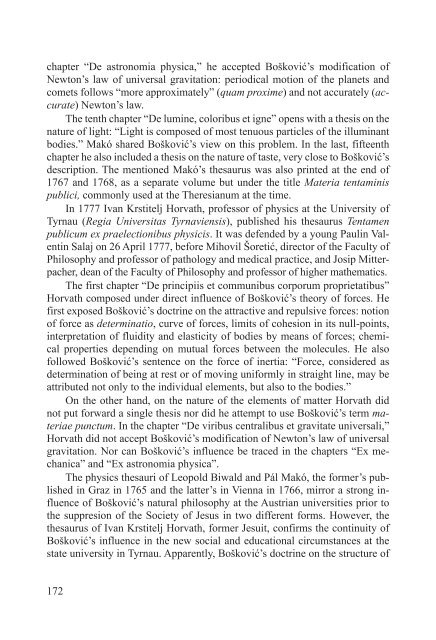Programska knjižica - Hrvatsko filozofsko društvo
Programska knjižica - Hrvatsko filozofsko društvo
Programska knjižica - Hrvatsko filozofsko društvo
Create successful ePaper yourself
Turn your PDF publications into a flip-book with our unique Google optimized e-Paper software.
chapter “De astronomia physica,” he accepted Bošković’s modification of<br />
Newton’s law of universal gravitation: periodical motion of the planets and<br />
comets follows “more approximately” (quam proxime) and not accurately (accurate)<br />
Newton’s law.<br />
The tenth chapter “De lumine, coloribus et igne” opens with a thesis on the<br />
nature of light: “Light is composed of most tenuous particles of the illuminant<br />
bodies.” Makó shared Bošković’s view on this problem. In the last, fifteenth<br />
chapter he also included a thesis on the nature of taste, very close to Bošković’s<br />
description. The mentioned Makó’s thesaurus was also printed at the end of<br />
1767 and 1768, as a separate volume but under the title Materia tentaminis<br />
publici, commonly used at the Theresianum at the time.<br />
In 1777 Ivan Krstitelj Horvath, professor of physics at the University of<br />
Tyrnau (Regia Universitas Tyrnaviensis), published his thesaurus Tentamen<br />
publicum ex praelectionibus physicis. It was defended by a young Paulin Valentin<br />
Salaj on 26 April 1777, before Mihovil Šoretić, director of the Faculty of<br />
Philosophy and professor of pathology and medical practice, and Josip Mitterpacher,<br />
dean of the Faculty of Philosophy and professor of higher mathematics.<br />
The first chapter “De principiis et communibus corporum proprietatibus”<br />
Horvath composed under direct influence of Bošković’s theory of forces. He<br />
first exposed Bošković’s doctrine on the attractive and repulsive forces: notion<br />
of force as determinatio, curve of forces, limits of cohesion in its null-points,<br />
interpretation of fluidity and elasticity of bodies by means of forces; chemical<br />
properties depending on mutual forces between the molecules. He also<br />
followed Bošković’s sentence on the force of inertia: “Force, considered as<br />
determination of being at rest or of moving uniformly in straight line, may be<br />
attributed not only to the individual elements, but also to the bodies.”<br />
On the other hand, on the nature of the elements of matter Horvath did<br />
not put forward a single thesis nor did he attempt to use Bošković’s term materiae<br />
punctum. In the chapter “De viribus centralibus et gravitate universali,”<br />
Horvath did not accept Bošković’s modification of Newton’s law of universal<br />
gravitation. Nor can Bošković’s influence be traced in the chapters “Ex mechanica”<br />
and “Ex astronomia physica”.<br />
The physics thesauri of Leopold Biwald and Pál Makó, the former’s published<br />
in Graz in 1765 and the latter’s in Vienna in 1766, mirror a strong influence<br />
of Bošković’s natural philosophy at the Austrian universities prior to<br />
the suppresion of the Society of Jesus in two different forms. However, the<br />
thesaurus of Ivan Krstitelj Horvath, former Jesuit, confirms the continuity of<br />
Bošković’s influence in the new social and educational circumstances at the<br />
state university in Tyrnau. Apparently, Bošković’s doctrine on the structure of<br />
172

















